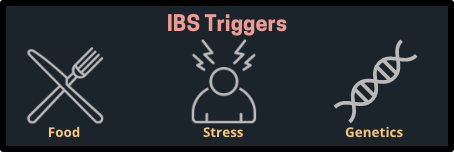Introducing: Irritable Bowel Syndrome
April is IBS Awareness Month. The International Foundation for Gastrointestinal Disorders (IFFGD) marked it so in 1997, to educate the world and therefore improve the experience of newly diagnosed patients.
IBS affects an estimated 10-15% of the world, making it one of the more common health conditions – Australia included. But what even is it?
IBS stands for irritable bowel syndrome. It mostly affects the large intestine – the fatter, 6-foot long tube that squeezes food through the final stages of digestion – but can affect any organs in the lower digestive system, hence the name irritable bowels.
IBS is not life-threatening, but it can cause moderate to severe discomfort and pain to those affected. The best way to reduce that pain is to know the symptoms and how to relieve them.
What are the symptoms of IBS?
The most common symptoms of IBS are pain, gas and bloating. Every person is different, but often patients experience stabbing pains and cramping as food and trapped gas pass through their intestines.
Constipation and diarrhoea affect patients equally – with many suffering from both simultaneously. The cycling between the two is called IBS-M (M = mixed), whereas IBS with constipation or diarrhoea alone is known as IBS-C and IBS-D, respectively.
Other faeces-related IBS symptoms are mucus in stool, constantly feeling full and excessive passing of wind. As well as changes in bowel movements, some IBS sufferers experience low iron levels (anaemia), fatigue, depression, anxiety and insomnia.
What causes IBS?
There are numerous known causes of IBS, but one single definitive answer to the question is yet to be found. Sometimes, it will come on suddenly after illness and bacteria growth, but other times it gradually worsens over time.
An abnormal digestive tract – either too strong or too weak intestines, for example – can make digestion painful or slow. Infection, stressful early life events and even an overreactive central nervous system might all be related to painful IBS symptoms.
IBS manifests itself differently in everyone, so while some people might be triggered by stress alone, others can deter a flare-up by avoiding certain foods. We will cover the many ways to avoid or relieve IBS later this month.
Foods that trigger IBS
Food allergies aren’t a cause of IBS so much as they can trigger a flare-up. Just as everyone’s symptoms are different, the foods to avoid are too. There are some common offenders, though, which include dairy, gluten, cruciferous veggies and pulses.
Many IBS sufferers try a low-FODMAP diet. FODMAP stands for fermentable oligosaccharides, disaccharides, monosaccharides and polyols – a group of sugars that are not digested well by the human gut.
A low-FODMAP diet cuts out a seemingly random selection of foods, which all have high levels of these sugars. Hard cheeses, brie and camembert are all fine, while cottage cheese, goat cheese and heavy cream are not. Cantaloupe melon is fine, while watermelon is not.
IBS Awareness Month
This April, we are raising awareness for IBS. As well as the important donations that go to fund research that eases the suffering of people with IBS, we are educating people to understand it better. Knowing the symptoms helps patients get help sooner, so no one has to suffer in silence.
Some people feel embarrassed talking to their doctor about stomach-related problems, but we can assure you that there is nothing they haven’t seen before. It is so much better to get help earlier, to prevent IBS from worsening and reduce your time spent in pain.
To get involved, check out the IFFGD’s IBS Awareness Month Toolkit and pick your favourite way to fundraise! If you are worried about your health or think you might have IBS, book an appointment with your doctor who will be happy to help.




